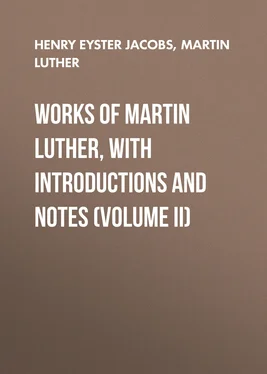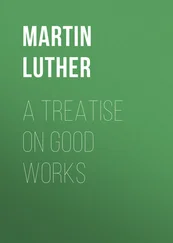Henry Eyster Jacobs - Works of Martin Luther, with Introductions and Notes (Volume II)
Здесь есть возможность читать онлайн «Henry Eyster Jacobs - Works of Martin Luther, with Introductions and Notes (Volume II)» — ознакомительный отрывок электронной книги совершенно бесплатно, а после прочтения отрывка купить полную версию. В некоторых случаях можно слушать аудио, скачать через торрент в формате fb2 и присутствует краткое содержание. Жанр: foreign_prose, foreign_religion, Философия, foreign_psychology, foreign_antique, на немецком языке. Описание произведения, (предисловие) а так же отзывы посетителей доступны на портале библиотеки ЛибКат.
- Название:Works of Martin Luther, with Introductions and Notes (Volume II)
- Автор:
- Жанр:
- Год:неизвестен
- ISBN:нет данных
- Рейтинг книги:3 / 5. Голосов: 1
-
Избранное:Добавить в избранное
- Отзывы:
-
Ваша оценка:
- 60
- 1
- 2
- 3
- 4
- 5
Works of Martin Luther, with Introductions and Notes (Volume II): краткое содержание, описание и аннотация
Предлагаем к чтению аннотацию, описание, краткое содержание или предисловие (зависит от того, что написал сам автор книги «Works of Martin Luther, with Introductions and Notes (Volume II)»). Если вы не нашли необходимую информацию о книге — напишите в комментариях, мы постараемся отыскать её.
Works of Martin Luther, with Introductions and Notes (Volume II) — читать онлайн ознакомительный отрывок
Ниже представлен текст книги, разбитый по страницам. Система сохранения места последней прочитанной страницы, позволяет с удобством читать онлайн бесплатно книгу «Works of Martin Luther, with Introductions and Notes (Volume II)», без необходимости каждый раз заново искать на чём Вы остановились. Поставьте закладку, и сможете в любой момент перейти на страницу, на которой закончили чтение.
Интервал:
Закладка:
This arbitrary will and lying "reservation" of the pope creates in Rome a state of affairs which is unspeakable. There is buying, selling, bartering, trading, trafficking, lying, deceiving, robbing, stealing, luxury, harlotry, knavery, and every sort of contempt of God, and even the rule of Antichrist could not be more scandalous. Venice, Antwerp, Cairo 181 181 The three chief centers of foreign commerce in the XV and the early XVI Century. The annual fairs ( Jahrmarkt ), held at stated times in various cities, brought great numbers of merchants together from widely distant points, and were the times when the greater part of the wholesale business for the year was done.;
are nothing compared to this fair which is held at Rome and the business which is done there, except that in those other places they still observe right and reason. At Rome everything goes as the devil wills, and out of this ocean like virtue flows into all the world. Is it a wonder that such people fear a reformation and a free council, and prefer to set all kings and princes at enmity rather than have them unite and bring about a council? Who could bear to have such knavery exposed if it were his own?
[Sidenote: The Dataria]
Finally, for all this noble commerce the pope has built a warehouse, namely, the house of the datarius 182 182 Built by Innocent VIII (1454-1490).
, in Rome. Thither all must come who deal after this fashion in benefices and livings. From him they must buy their "glosses" 183 183 See above, p. 93, note 2.
and get the power to practice such archknavery. In former times Rome was generous, and then justice had either to be bought or else suppressed with money, but now she has become exorbitant, and no one dare be a knave unless with a great sum he has first bought the right. If that is not a brothel above all the brothels one can imagine, then I do not know what brothel means.
If you have money in this house, then you can come by all the things I have said; and not only these, but all sorts of usury 184 184 The Church law forbade the taking of interest on loans of money.
are here made honest, Phil. 2:5 for a consideration, and the possession of all property acquired by theft or robbery is legalised. Here vows are dissolved; here monks are granted liberty to leave their orders; here marriage is on sale to the clergy; here bastards can become legitimate; here all dishonor and shame can come to honor; all ill-repute and stigma of evil are here knighted and ennobled; here is permitted the marriage which is within the forbidden degrees or has some other defect 185 185 During the Middle Ages all questions touching marriage and divorce, including, therefore, the question of the legitimacy of children, were governed by the laws of the Church, on the theory that marriage was a sacrament.
. Oh! what a taxing and a robbing rules there! It looks as though all the laws of the Church were made for one purpose only—to be nothing but so many money-snares, from which a man must extricate himself 186 186 i. e., By buying dispensations.
if he would be a Christian. Yea, here the devil becomes a saint, and a god to boot. What heaven and earth cannot, that this house can do! They call them compositiones 187 187 The sums paid or special dispensations were so called.
! "Compositions" indeed! rather "confusions"! Oh, what a modest tax is the Rhine-toll 188 188 The toll which the "robber-barons" of the Rhine levied upon merchants passing through their domains.
, compared with the tribute taken by this holy house!
Let no one accuse me of exaggeration! It is all so open that even at Rome they must confess the evil to be greater and more terrible than any one can say. I have not yet stirred up the hell-broth of personal vices, nor do I intend to do so. I speak of things which are common talk, and yet I have not words to tell them all. The bishops, the priests and, above all, the doctors in the universities, who draw their salaries or this purpose, should have done their duty and with common consent have written and cried out against these things; but they have done the very opposite 189 189 Ja wend das blat umb szo indistu es —The translators have adopted the interpretation of O. Clemen, L's. Werke , I, 383.
.
[Sidenote: The Fuggers]
There remains one last word, and I must say that too. Since boundless Avarice has not been satisfied with all these treasures, which three great kings might well think sufficient, he now begins to transfer this trade and sell it to Fugger of Augsburg 190 190 The Fuggers of Augsburg were the greatest of the German capitalists in the XVI Century. They were international bankers, "the Rothschilds of the XVI Century." Their control of large capital enabled them to advance large sums of money to the territorial rulers, who were in a chronic state of need. In return for these favors they received monopolistic concessions by which their capital was further increased. The spiritual, as well as the temporal lords, availed themselves regularly of the services of this accommodating firm. They were the pope's financial representatives in Germany. On their connection with the indulgence against which Luther protested, see Vol. I, p. 21; on their relations with the papacy, see Schulte, Die Fugger in Rom , 2 Vols., Leipzig, 1904.
, so that the lending and trading and buying of bishoprics and benefices, and the driving of bargains in spiritual goods has now come to the right place, and spiritual and temporal goods have become one business. And now I would fain hear of a mind so lofty that it could imagine what this Roman Avarice might yet be able to do and has not already done; unless Fugger were to transfer or sell this combination of two lines of business to somebody else. I believe we have reached the limit.
As for what they have stolen in all lands and still steal and extort, by means of indulgences, bulls, letters of confession 191 191 Certificates entitling the holder to choose his own confessor and authorizing the confessor to absolve him from certain classes of "reserved" sins; referred to in the XCV Theses as confessionalia . Cf. Vol. I, p. 22.
, "butter-letters" 192 192 Certificates granting their possessor permission to eat milk, eggs, butter and cheese on fast days.
and other confessionalia 193 193 The word is used here in the broad sense, and means dispensations of all sorts, including those just mentioned, relating to penance.
,—all this I consider mere patch-work, and like casting a single devil more into hell 194 194 Equivalent to "carrying coals to Newcastle."
. Not that they bring in little, for a mighty king could well support himself on their returns, but they are not to be compared with the streams of treasure above mentioned. I shall also say nothing at present of how this indulgence money has been applied. Another time I shall inquire about that, for Campoflore 195 195 The Campo di Fiore , a Roman market-place, restored and adorned at great expense by Eugenius IV (1431-1447), and his successors.
and Belvidere 196 196 A part of the Vatican palace notorious as the banqueting-hall of Alexander VI (1402-1503), turned by Julius II (1503-1513) into a museum for the housing of his wonderful and expensive collection of ancient works of art. Luther is hinting that the indulgence money has been spent on these objects rather than on the maintenance of the Church. Cf. Clemen, I, 384, note 15.
and certain other places probably know something about it.
Since, then, such devilish rule is not only open robbery and deceit, and the tyranny of the gates of hell, but also ruins Christendom in body and soul, it is our duty to use all diligence in protecting Christendom against such misery and destruction. If we would fight the Turks, let us make a beginning here, where they are at their worst. If we justly hang thieves and behead robbers, why should we let Roman Avarice go free? For he is the greatest thief and robber that has come or can come into the world, and all in the holy Name of Christ and of St. Peter! Who can longer endure it or keep silence? Almost everything he owns has been gotten by theft and robbery; that is the truth, and all history shows it. The pope never got by purchase such great properties that from his officia 197 197 i. e., The offices and positions in Rome which were for sale. See Benrath, p. 88, note 18; p. 95, note 36.
alone he can raise about a million ducats, not to mention the mines of treasure named above and the income of his lands. Nor did it come to him by inheritance from Christ or from St. Peter; no one ever loaned it or gave it to him; it has not become his by virtue of immemorial use and enjoyment. Tell me, then, whence he can have it? Learn from this what they have in mind when they send out legates to collect money or use against the Turks.
Интервал:
Закладка:
Похожие книги на «Works of Martin Luther, with Introductions and Notes (Volume II)»
Представляем Вашему вниманию похожие книги на «Works of Martin Luther, with Introductions and Notes (Volume II)» списком для выбора. Мы отобрали схожую по названию и смыслу литературу в надежде предоставить читателям больше вариантов отыскать новые, интересные, ещё непрочитанные произведения.
Обсуждение, отзывы о книге «Works of Martin Luther, with Introductions and Notes (Volume II)» и просто собственные мнения читателей. Оставьте ваши комментарии, напишите, что Вы думаете о произведении, его смысле или главных героях. Укажите что конкретно понравилось, а что нет, и почему Вы так считаете.












